Case Studies
Our team collaborates with staff from across the university to provide tailor made sessions on a whole variety of topics including, but not limited to, time management, exam preparation, academic integrity, dissertation writing, maths and stats.
See below for some examples of existing sessions, or get in touch to find out what we can do for your students.
Find a list of our advisers, their areas of expertise and their contact details:
Medium Sized Cohorts (26-100 Students)
Academic Skills for MSc Genetics
College: Medical, Veterinary and Life Sciences
Program Title: MSc Genetics
Level: Postgraduate Taught (PGT)
Class size: Medium (26-100)
Objectives:
- Support student transitions from diverse academic contexts and professional backgrounds into their degree programme through exploration of academic expectations and practices at UofG.
- Specifically, develop new cohort’s understanding of skills in academic integrity and effective, critical reading at PGT level to enhance success in assignments.
What did we provide?
Dr Mona O’Brien (Effective Learning Adviser for International Students, all Colleges) delivered one 2-hour interactive lecture:
- Hour one covered strategies and exercises to develop effective critical reading and manage reading loads at PGT-level.
- Hour two explained the UofG definition of plagiarism, AI awareness, the importance of academic integrity and worked through relevant examples and exercises on recognising plagiarism.
Key collaborative steps with course staff
- Consultation about transition to studying genetics at PGT level and challenges faced by the cohort in previous years.
- Collaboration on examples, e.g. of correct referencing.
- Collaborative review of the slides before the session.
- Session embedded in students’ timetable.
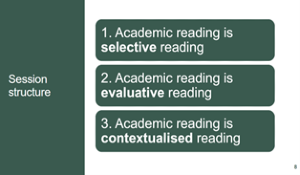
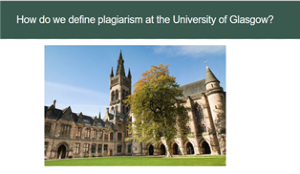
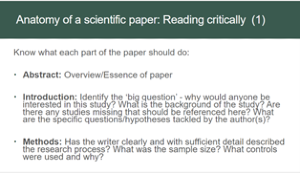
Dissertation Workshops for Translation Studies
College: Arts and Humanities
Program Title: MSc Translation Studies
Level: Postgraduate Taught (PGT)
Class size: Medium (50-100)
Objectives:
- Support students’ academic literacies development as part of the Glasgow-Nankai international partnership.
- Specifically, develop students’ understanding of the core skills needed to write a postgraduate level dissertation in Translation Studies. These skills include writing effective research questions, developing a critical voice, and constructing an effective argument.
What did we provide?
As part of this wider suite of SLD in-course provision (4 sessions total), Amber Hinde (Effective Learning Adviser for International Students, all Colleges) delivered one 2-hour session on constructing an effective argument:
- Hour one was a lecture covering the building blocks of a successful and coherent dissertation argument in Translation Studies.
- Hour two was an interactive workshop in which the students analysed some text examples themselves, evaluating how existing scholars in Translation Studies build effective arguments in their written work.
Key collaborative steps with course staff
- Consultation about collaborative aims between SLD and Translation Studies staff, including discussion of the main challenges faced by the cohort.
- Collaborative approach to embedding provision in students’ timetable, assessing critical points in the semester for specific sessions.
- Collaboration on examples, e.g. subject-specific journal articles provided by Translation Studies staff, supporting the use of relevant examples for the students.
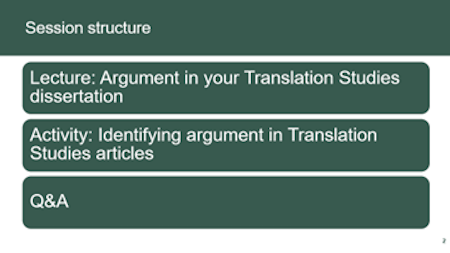
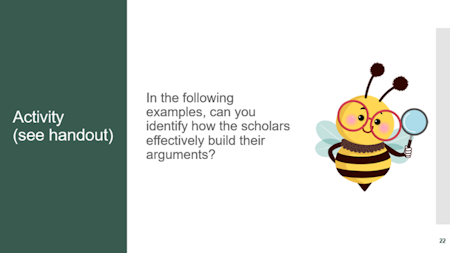
Pre-sessional Maths and Stats
College: Social Sciences
Program Title: Accounting & Finance
Level: Postgraduate Taught (PGT)
Class size: Medium (26-100)
Objectives:
Students enrolling on PGT programmes in Accounting and Finance come from many different backgrounds and so may have gone several years without any exposure to maths and/or stats. The goal was to:
- Prepare these students for their course by covering the prerequisite maths and stats.
- Do this before the course begins to avoid overburdening the students once semester starts.
What did we provide?
During orientation week, Dr Jenny August (Maths Adviser) and Dr George Vazanellis (Stats Adviser) each gave a four-lecture course:
- One course on matrix algebra, giving students the tools to solve systems of linear equations and manipulate equations involving matrices.
- One course on basic statistics, including descriptive statistics, probability, hypothesis testing, and linear regression.
Each course also had a Moodle page, where extra resources and materials were added, including practice questions.
Key collaborative steps with course staff
- Consultation with staff about which topics were important to cover in each course.
- Staff timetabled the sessions and enrolled all students on the Moodle pages, as well as communicating with the students and setting expectations about attendance.
- Staff collected feedback from students in the course survey and reported back to SLD.

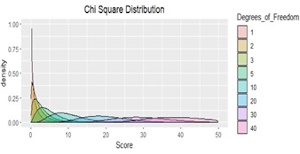
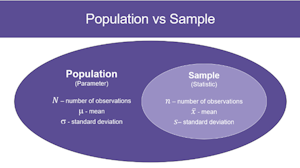
Workshop on Modified Essay Questions (MEQ)
College: Medical, Veterinary and Life Sciences
Program Title: MBChB Medicine
Level: Glasgow Access Programme (GAP)
Class size: Medium (26-100)
Objectives:
- Students reported feeling unsure about how to write practice MEQs (Modified Essay Questions) and how to tackle them in assessments.
- Course staff noticed underperformance in MEQ-style assessments, relative to MCQ.
- Course leader wanted a new workshop designed to explain what MEQs are, how students should approach them, and how students should write them to aid their revision.
What did we provide?
Dr Rosalind McKenna (Effective Learning Adviser for MVLS) was scheduled to deliver a one 1-hour ‘MEQ Writing Workshop’ covering:
- Study techniques (what to do with notes, how to integrate topics)
- What MEQs are, where the value lies in using them for learning and assessment
- Approaches to answering MEQs effectively (using course-specific examples)
- Advice on writing MEQs to create effective revision resources for course ILOs
- Time for groups to start writing own MEQ and associated mark scheme
Students continued to work in their groups after the workshop and submitted their group MEQ and mark scheme documents to the relevant Teams channel for the course.
Key collaborative steps with course staff
- Consultation about the course aims and ILOs, and students’ previous experiences of MEQs and group problem-solving.
- Discussion about course teaching staff’s feedback on students’ previous approaches towards and attempts at MEQ-style problems.
- Collaboration with course staff on best disciplinary examples to use
- Session was embedded in the core timetable for the course.
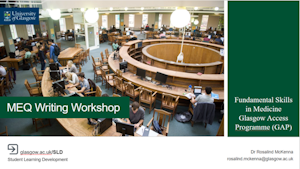
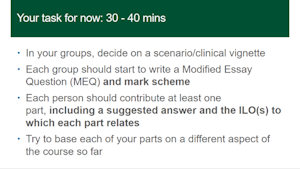
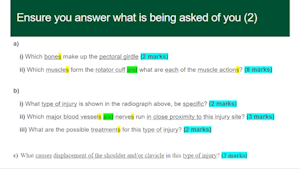
Large Cohorts (101-300 Students)
Academic Literacies for Level 1 Geography
College: Science & Engineering
Program title: BSc/MA Geography
Level: 1
Course title: Geography 1
Class size: Medium (26-100), multiple repeats
Objectives
- Students must complete a series of workshops to develop their academic literacies and skills within the school.
- High impact area of study as it's one of the first introductions to good academic practice within the institution.
- Course staff wanted a series of workshops to prepare students for the activity-based sessions, so that all students have a more even base on which to build.
What did we provide?
Dr James Rowe (Effective Learning Adviser for CoSE) was scheduled to deliver 5 in-person workshops (each repeated for 4 different class groups) covering:
- Academic Sources, Referencing and Plagiarism
- Academic Writing and Critical Thinking
- Exam Preparation
- Understanding Feedback
- Academic Presentations
Students then attended a workshop the following week, working through practical activities related to the previous session, developed by course staff.
Key collaborative steps with course staff
- Consultation about the course aims and ILOs, and session topics required throughout the course.
- Iterative process integrating feedback from course staff into session materials.
- Sessions were embedded in the core timetable for the course, using a total of twenty hours of timetabled class time.
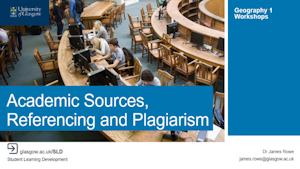
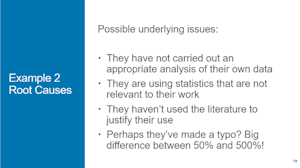
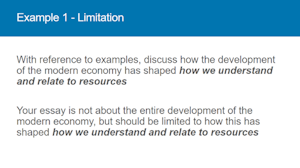
Asynchronous Skills Development for LLB Dissertations
College: Social Sciences
Program Title: Bachelor of Laws (LLB)
Level: Honours
Class size: Large (101-300)
Objectives:
The LLB Dissertation increased from a 30 credit course to a 40 credit course and the module leader wanted to use the credit uplift to increase traditionally lacking support for dissertation writing in the course.
What did we provide?
Dr Aleix Tura Vecino (Effective Learning Adviser for CoSS), Dr Sally Gales, and Rachel Lewise (GTAs for Student Learning Development) created five asynchronous Skill Development Units for Years 3 and 4:
- Finding a Topic and Formulating a Research Question
- Planning and Structure
- Research Methods
- Critical Reading and Writing
- Editing and Implementing Feedback
Units were created in Articulate and included tailored examples and practice exercises for students to complete at strategic points in their dissertation journey.
Key collaborative steps with course staff
- Collaboration with module convener on deciding topics and best disciplinary examples and exercises.
- Feedback loop between SLD and module convener to improve the Units before release.
- Co-creation of a timeline to release the Units at strategic points for maximum impact.
- Units embedded in course Moodle, and advertised through introductory lecture and Moodle announcements.
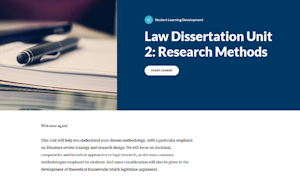

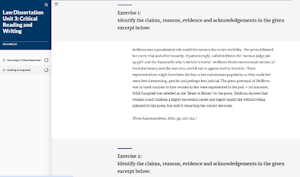
Maths Diagnostic Test for First Year Students
College: Social Sciences
Program Title: Economics
Level: 1
Class size: Large (101-300)
Objectives:
Staff reported that students often lack the mathematical skills expected of them on arrival at university, despite high entry requirements. The goal was to find a way to:
- Allow staff to identify the common weaknesses of the cohort.
- Allow students to identify gaps in their knowledge/skills and give them the tools to help them fill these gaps.
What did we provide?
Dr Jenny August (Maths Adviser) designed a maths diagnostic quiz, which the students completed on Moodle in the first two weeks of Semester 1:
- The test contained six topics based on Higher Mathematics, each with five questions.
- For each topic, the student received a mark and a recommendation about whether they should attend an associated workshop.
Over the following six weeks, Jenny led refresher sessions on each of the topics, and provided practice questions to help the students get to grips with the material. Jenny also provided staff with a comprehensive report on the results of the test, which identified where common issues lay.
Key collaborative steps with course staff
- Consultation about which topics in Higher Mathematics are/are not relevant for an Economics degree.
- Staff collected feedback from students at the department’s SSLC, and passed this back to Jenny.
- Follow-up meeting to discuss the results, potential changes for next year, and the introduction of a further maths diagnostic test for students at Honours level.
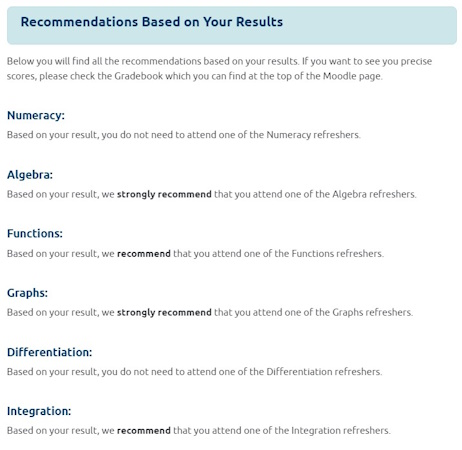
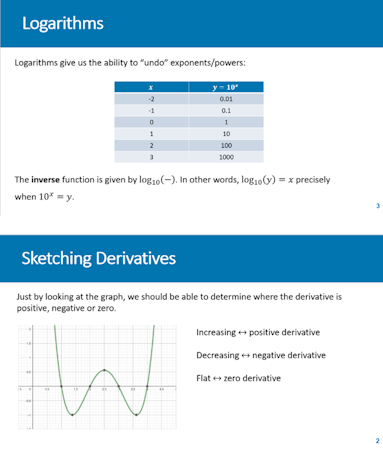
Maths Drop-ins and Revision Sessions
College: Science and Engineering
Course: Engineering Maths 2/Mathematics AE2X
Level: 2
Class size: Large (101-300)
Objectives:
Maths is an essential skill for all Engineering students, but it can be a stumbling block for some of them. This has been particularly the case in recent years for students whose earlier maths education was badly disrupted by COVID 19.
Our goal was to encourage these students to seek any help they needed by offering them a space to work on their maths where tutors were available to help with any questions that arose.
What did we provide?
-
During term time, Dr Jenny August (Maths Adviser) provided optional weekly drop-ins specifically for these students.
-
Students could come along at any point in the session to get help with any problems they were stuck on, or to get some guidance how to fill any gaps in their knowledge.
- In the run up to exams, Jenny offered additional drop-ins which students largely used to get help with past paper questions, and she also ran sessions aimed at preparing these students for effective maths revsion.
Key collaborative steps with course staff
- Admin staff in the school liased with Jenny about when was best to hold the sessions, booked the rooms and added them to students' timetables.
- Staff provided Jenny with access to the Moodle page so she could see the course content and contact students directly.
- Jenny discussed with Mathematics AE2X staff what to include in the revision sessions, and updated staff on the attendance.

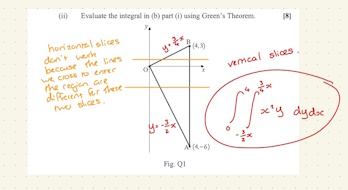
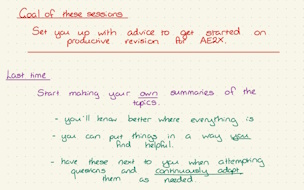
Probability for Level 1 Biology
College: Medical, Veterinary and Life Sciences
Program Title: All Life Sciences degrees
Level: 1
Course: Biology 1B
Class size: Large (101-300)
Objectives:
To introduce/refresh students’ fundamental knowledge of probability (e.g. basic probability laws, discrete vs continuous probability distributions, commonly used probability distributions).
What did we provide?
Dr George Vazanellis (Stats Adviser) delivered a 1-hour lecture with an interactive quiz. Students had a chance to test their knowledge of probability (or intuition) by answering questions displayed at the beginning of the lecture.
For example, “If I usually sell 20 pizzas in one day, what is the probability I will sell fewer than 5 pizzas on a random day?”.
Key collaborative steps with course staff
- Course coordinator reached out to us and asked if we can present a probability lecture.
- We requested a list of ILOs for the lecture and subsequently prepared the lecture and delivered it in the students’ regular course timetable.
Extra Large Cohorts (>300 students)
Developing a Source Selection & Evaluation Resource for Pre-Honours English Literature Students
College: Arts and Humanities
Program Title: MA English Literature
Course: English Literature 2B: Writing the Body
Level: 2
Class size: Extra Large (>300)
Objectives
- Trends in course assessment feedback showed students struggled with source selection and evaluation, a key skill required to successfully progress to Honours study.
- Course Convener wanted to produce a resource to improve students' criticality skills.
What did we provide?
Dr Stuart Purcell (Effective Learning Adviser for CoAH) created a bespoke, asynchronous resource titled, ‘Being critical’ in your research for English Literature 2B:
- Built using Articulate 360 and embedded on the course Moodle.
- Dynamic, interactive, and featured course-specific examples.
- Covered key aspects of critically identifying, selecting, and evaluating sources, addressing specific issues highlighted by Course Convenor and tutors.
- Included a quiz and further resources for students to reflect upon their learning and continue to improve their criticality skills.
Key collaborative steps with course staff
- Collaborating with the Course Convenor and Good Practice Adviser (ADD) on wider project, including hiring student interns from previous course cohorts to facilitate focus groups with current cohort students.
- Drawing on Course Convenor’s experience and knowledge of ILOs and assessment criteria, as well as requirements of progression to Honours.
- Resource was embedded in course Moodle and time for students to engage with it was included in teaching schedule.
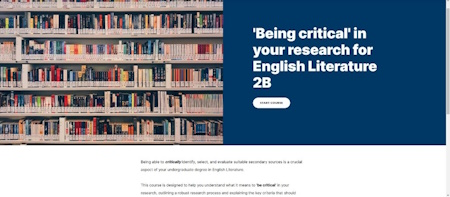
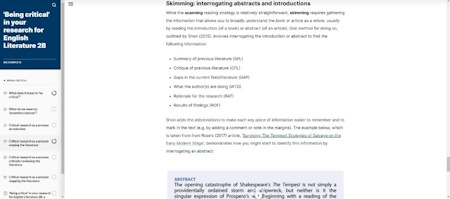
Life Sciences Exam Preparation
College: Medical, Veterinary and Life Sciences
Program Title: All life sciences programs
Level: Honours
Class size: Extra Large (> 300)
Objectives:
- Mid-way through semester 2 of academic session 2023-24, the decision was made to change the format of the Year 3 and Year 4/final honours exam from online and open book to invigilated, in-person, hand-written exams that take place on campus.
- Students reported feeling ill-equipped to perform well with the changed format and were anxious to adopt appropriate revision strategies.
- Course staff wanted expert advice and support putting in place to reassure students and prepare them sufficiently for the challenging change in exam format.
What did we provide?
Within 10 days of the announced change of format, Dr Rosalind McKenna (Effective Learning Adviser for MVLS) designed, prepared, and posted on Moodle:
- slides and an accompanying recording of a presentation on ‘Exam Revision Strategies’, emphasising effective techniques for invigilated, in-person, hand-written exams.
- slides and an accompanying recording of a presentation on ‘Exam Logistics’, walking students through what to expect from in-hall exams and how best to prepare.
Rosalind also organised, designed, and delivered two 1-hour, large-scale, live sessions on ‘Exam Preparation’, timetabled in separately for both cohorts to attend.
Key collaborative steps with course staff
- Consultation with course staff about their own and their students’ concerns about the change in exam format.
- Collaboration with course staff and Professional Services staff to embed the live sessions into both cohorts’ timetables, in order to enable student attendance.
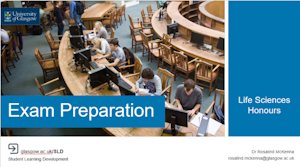
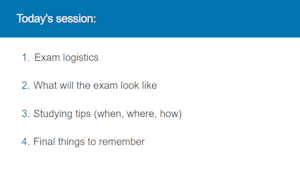
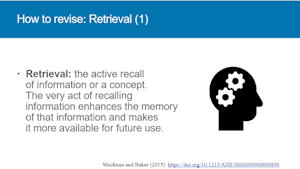
Research Skills Training in Politics and International Relations
College: Social Sciences
Program Title: Politics and International Relations
Level: 4 and PGT
Course Title: Dissertation Research Methods
Class size: Large (101-300) and Extra Large (>300)
Objectives
- Research methods in social sciences is a complex, challenging topic; students often struggle to align their research questions with clearly articulated methodologies and methods.
- Dissertation students are also often away from Glasgow while conducting research, and as such require online and blended research methods training to allow them easy access to the course materials.
What did we provide?
- Working in partnership, SLD and subject area staff designed, developed and built a brand-new research methods course for UGs and PGTs.
- They used a flipped and blended approach to create a flexible course, meeting the requirements of the students’ research processes.
- In addition, SLD ran bespoke workshops to provide students with practical, hands-on examples of working with different subject-specific texts and challenges.
Key collaborative steps with course staff
- SLD and subject area staff jointly created a funding bid that linked together the two areas of expertise.
- With funding successful, the two teams co-designed, co-built, and co-taught the course.

